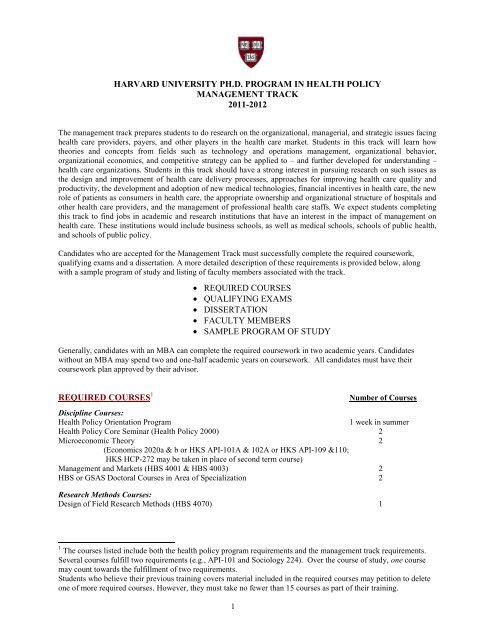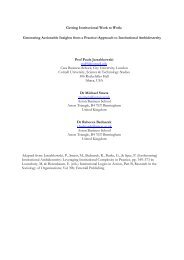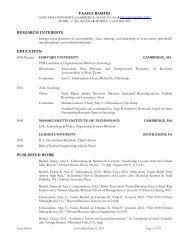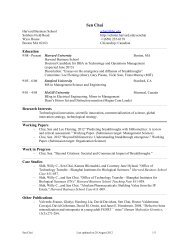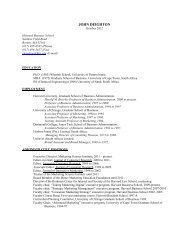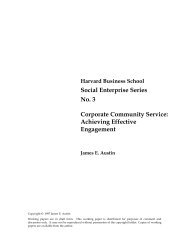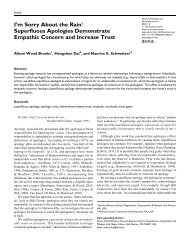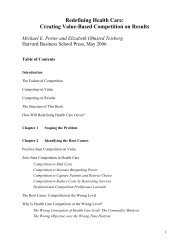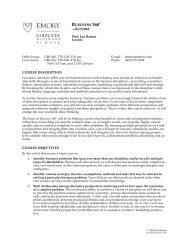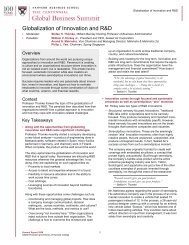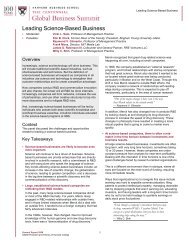Management Requiremen+ - Harvard Business School
Management Requiremen+ - Harvard Business School
Management Requiremen+ - Harvard Business School
You also want an ePaper? Increase the reach of your titles
YUMPU automatically turns print PDFs into web optimized ePapers that Google loves.
HARVARD UNIVERSITY PH.D. PROGRAM IN HEALTH POLICY<br />
MANAGEMENT TRACK<br />
2011-2012<br />
The management track prepares students to do research on the organizational, managerial, and strategic issues facing<br />
health care providers, payers, and other players in the health care market. Students in this track will learn how<br />
theories and concepts from fields such as technology and operations management, organizational behavior,<br />
organizational economics, and competitive strategy can be applied to – and further developed for understanding –<br />
health care organizations. Students in this track should have a strong interest in pursuing research on such issues as<br />
the design and improvement of health care delivery processes, approaches for improving health care quality and<br />
productivity, the development and adoption of new medical technologies, financial incentives in health care, the new<br />
role of patients as consumers in health care, the appropriate ownership and organizational structure of hospitals and<br />
other health care providers, and the management of professional health care staffs. We expect students completing<br />
this track to find jobs in academic and research institutions that have an interest in the impact of management on<br />
health care. These institutions would include business schools, as well as medical schools, schools of public health,<br />
and schools of public policy.<br />
Candidates who are accepted for the <strong>Management</strong> Track must successfully complete the required coursework,<br />
qualifying exams and a dissertation. A more detailed description of these requirements is provided below, along<br />
with a sample program of study and listing of faculty members associated with the track.<br />
REQUIRED COURSES<br />
QUALIFYING EXAMS<br />
DISSERTATION<br />
FACULTY MEMBERS<br />
SAMPLE PROGRAM OF STUDY<br />
Generally, candidates with an MBA can complete the required coursework in two academic years. Candidates<br />
without an MBA may spend two and one-half academic years on coursework. All candidates must have their<br />
coursework plan approved by their advisor.<br />
REQUIRED COURSES 1<br />
Number of Courses<br />
Discipline Courses:<br />
Health Policy Orientation Program<br />
1 week in summer<br />
Health Policy Core Seminar (Health Policy 2000) 2<br />
Microeconomic Theory 2<br />
(Economics 2020a & b or HKS API-101A & 102A or HKS API-109 &110;<br />
HKS HCP-272 may be taken in place of second term course)<br />
<strong>Management</strong> and Markets (HBS 4001 & HBS 4003) 2<br />
HBS or GSAS Doctoral Courses in Area of Specialization 2<br />
Research Methods Courses:<br />
Design of Field Research Methods (HBS 4070) 1<br />
1 The courses listed include both the health policy program requirements and the management track requirements.<br />
Several courses fulfill two requirements (e.g., API-101 and Sociology 224). Over the course of study, one course<br />
may count towards the fulfillment of two requirements.<br />
Students who believe their previous training covers material included in the required courses may petition to delete<br />
one of more required courses. However, they must take no fewer than 15 courses as part of their training.<br />
1
Statistics 1<br />
Choice of: HBS 4807. Probability and Statistics [Not offered in 2011-2012]<br />
Economics 2110. Introductory Probability and Statistics for Economists<br />
Statistics 104. Introduction to Quantitative Methods for Economics<br />
HKS API-201A. Quantitative Analysis and Empirical Methods<br />
HKS API-209. Advanced Quantitative Methods I: Statistics<br />
Econometrics 1<br />
Choice of: HBS 4808. Statistical Models and Methods [Not offered in 2011-2012]<br />
Economics 1123. Introduction to Econometrics<br />
Economics 2120. Introduction to Applied Econometrics<br />
HKS API-202A. Empirical Methods II<br />
HKS API-210. Advanced Quantitative Methods II: Econometric Methods<br />
Statistics 139. Statistical Sleuthing through Linear Models<br />
Statistics 149. Statistical Sleuthing through Generalized Linear Models<br />
Psychology 1952. Multivariate Analysis in Psychology<br />
Sociology 202. Intermediate Quantitative Research Methods<br />
Sociology 203a. Advanced Quantitative Research Methods<br />
GSE S-030. Intermediate Statistics: Applied Regression & Data Analysis (with permission)<br />
GSE S-052. Applied Data Analysis (with permission)<br />
Additional course offerings from HSPH Biostatistics Department and other schools may apply.<br />
Health Policy Program Distribution Requirement Courses:<br />
Epidemiology (HSPH EPI500)<br />
½<br />
Candidates must take an appropriate course in two of the following areas: 2<br />
Political Analysis: HKS SUP-575 / HSPH HPM 247. Political Analysis and Strategy for U.S.<br />
Health Policy<br />
Decision Sciences: HSPH RDS 280. Decision Analysis for Health & Medical Practices<br />
HSPH RDS 282. Economic Evaluation for Health Policy & Program<br />
<strong>Management</strong><br />
HSPH RDS 284. Decision Theory [Not offered in 2011-2012]<br />
HSPH RDS 285. Decision Analysis Methods in Public Health and Medicine<br />
Medical Sociology: Psychology 2630. Social Behavior in Organizations [Not offered in 2011-2012]<br />
Sociology 224. Organizational Analysis<br />
MIT 15.311 Organizational Processes<br />
MIT 15.341 Individuals, Groups, and Organizations [Not offered in 2011-2012]<br />
MIT 15.342 Organizations and Environments<br />
Ethics: HKS DPI-201. The Responsibilities of Public Action<br />
LAW-96715A. Reproductive Tech & Genetics: Legal and Ethical [Not offered<br />
in 2011-2012]<br />
HSPH GHP 293. Individual and Social Responsibility for Health<br />
HSPH ID 250. Ethical Basis of the Practice of Public Health<br />
HSPH ID 251. Ethical Basis of the Practice of Public Health: Health Care<br />
Delivery<br />
HSPH ID 292. Justice and Resource Allocation<br />
HSPH ID 513. Ethics and Health Disparities [Not offered in 2011-2012]<br />
Economics: Economics 1011a. Microeconomic Theory<br />
Economics1460 / HKS SUP-572. The Economics of Health Care Policy<br />
Economics 2020a. Microeconomic Theory I<br />
Economics 2020b. Microeconomic Theory II<br />
HKS API-101. Markets and Market Failure<br />
HKS API-302. Analytic Frameworks for Policy<br />
HSPH GHP 291. Microeconomics and Applications to Public Health in<br />
Developing Countries [Not offered in 2011-2012]<br />
HSPH HPM206. Economic Analysis<br />
2
MBA Courses:<br />
General <strong>Management</strong> 1<br />
Choice of: HBS 1230. Corporate Strategy<br />
HBS 1504. Building and Sustaining a Successful Enterprise<br />
HBS 1534. Global Strategic <strong>Management</strong><br />
HBS 1582. Leading And Governing High Performing Nonprofit Organizations<br />
HBS 1630. Entrepreneurial <strong>Management</strong> in a Turnaround Environment<br />
HBS 1908. <strong>Business</strong> at the Base of the Pyramid<br />
HBS 2010. Board of Directors and Corporate Governance<br />
HBS 2030. Leading Innovative Ventures [Not offered in 2011-2012]<br />
HBS 2060. Managing Human Capital<br />
HBS 2108. Coordinating and Managing Supply Chains<br />
HBS 2120. Managing Service Operations<br />
HBS 2166. Operations Strategy: Managing Growth<br />
Healthcare 1<br />
Choice of: HBS 1660. Entrepreneurship and Venture Capital in Health Care<br />
HBS 2180. Innovating in Health Care<br />
HBS 2190. Managing Medicine [Not offered in 2011-2012]<br />
HBS 2230. Managing Global Health: Design, Delivery, and Evaluation of Global Health Programs<br />
[Not offered in 2011-2012]<br />
Elective MBA: 2 or 5<br />
Students who do not have an MBA are required to take two additional<br />
second-year MBA courses (2 courses) or the first semester of the MBA<br />
program (5 courses). Students electing the first semester option need not<br />
take a General <strong>Management</strong> course.<br />
Total Courses<br />
15.5 (with prior MBA)<br />
17.5 (with second-year MBA courses)<br />
19.5 (with first semester MBA program)<br />
3
QUALIFYING EXAMS<br />
1. Health Policy General Exam: At the conclusion of the second year of coursework, candidates are expected to take<br />
and pass both a written and oral exam. This exam is given under the supervision of a member of the<br />
Committee on Higher Degrees on Health Policy and tests candidates’ general knowledge of health<br />
policy topics.<br />
2. Special Field Exam: During the third academic year, a candidate should take and pass this exam, which is<br />
designed to test the candidate’s depth and breadth of knowledge in his or her chosen special field and<br />
to help the candidate develop skills in acquiring and using knowledge in new areas. Candidates choose<br />
fields of interest related to their expected dissertation research, develop an exam reading list (typically<br />
100-125 readings), and submit that reading list to their Special Field Exam Committee for approval.<br />
The Committee consists of three faculty members selected by the candidate; one of those faculty<br />
members must be an HBS professor. The student is expected to develop his or her own study tools that<br />
facilitate critical understanding of the field, including the ability to summarize existing theoretical and<br />
empirical research, to identify gaps in the field, and to suggest theoretical contributions. The exam<br />
will include a written and oral portion, the timing and format of which will be determined jointly by<br />
the student and Committee members.<br />
DISSERTATION<br />
Health Policy Research Seminar (Health Policy 3040hf): To monitor and encourage progress on dissertations, all<br />
candidates in their third- year or above are required to attend this weekly seminar. During the seminar,<br />
students present all stages of their dissertation work, starting with the proposal.<br />
Dissertation Proposal Exam: Before June 15 th of the third academic year and prior to the commencement of a<br />
candidate’s dissertation, a candidate is expected to form a dissertation committee, submit a written<br />
proposal and pass an oral exam on his or her dissertation proposal. The chair for this exam will be a<br />
member of the <strong>Management</strong> Track Committee for Higher Degrees in Health Policy. The committee<br />
should also include a non-<strong>Business</strong> <strong>School</strong> member of the Committee on Higher Degrees in Health<br />
Policy and one or two appropriate other faculty members, depending on the proposed dissertation. The<br />
candidate should take the initiative in staffing his or her dissertation committee subject to approval of<br />
the committees’ chairperson. If a candidate does not have a formal proposal approved by June 15 th of<br />
his or her third year, he or she must still meet with his or her committee to discuss any thoughts to<br />
date, and to have the committee sign a progress form.<br />
Dissertation Committee Meetings: After passing the dissertation proposal exam, students are expected to meet with<br />
their dissertation committee at least twice each academic year (preferably one meeting per semester).<br />
One of the meetings must be with all the members of their dissertation committee physically present.<br />
The other meeting may be by teleconference if necessary. For documentation of these meetings, the<br />
health policy program office will provide forms, which students will be expected to return to the<br />
program office.<br />
Dissertation Oral Defense: To graduate, candidates must submit and orally defend their dissertation to their<br />
committee.<br />
For a detailed description of the requirements associated with the dissertation, please refer to the dissertation section<br />
of the program's internal site: http://isites.harvard.edu/icb/icb.do?keyword=k463<br />
4
FACULTY MEMBERS (associated with the <strong>Management</strong> Track)<br />
Nava Ashraf, Associate Professor of <strong>Business</strong> Administration, <strong>Harvard</strong> <strong>Business</strong> <strong>School</strong><br />
Julie Battilana, Associate Professor of <strong>Business</strong> Administration, <strong>Harvard</strong> <strong>Business</strong> <strong>School</strong><br />
David Blumenthal, Samuel O. Thier Professor of Medicine, <strong>Harvard</strong> Medical <strong>School</strong><br />
Richard M. Bohmer, Professor of <strong>Management</strong> Practice, <strong>Harvard</strong> <strong>Business</strong> <strong>School</strong><br />
Clayton M. Christensen, Kim B. Clark Professor of <strong>Business</strong> Administration, <strong>Harvard</strong> <strong>Business</strong> <strong>School</strong><br />
Arthur A. Daemmrich, Assistant Professor of <strong>Business</strong> Administration, <strong>Harvard</strong> <strong>Business</strong> <strong>School</strong><br />
Amy C. Edmondson, Co-Chair, Novartis Professor of Leadership and <strong>Management</strong>, <strong>Harvard</strong> <strong>Business</strong> <strong>School</strong><br />
Richard Hamermesh, MBA Class of 1961 Professor of <strong>Management</strong> Practice, <strong>Harvard</strong> <strong>Business</strong> <strong>School</strong><br />
Regina E. Herzlinger, Nancy R. McPherson Professor of <strong>Business</strong> Administration, <strong>Harvard</strong> <strong>Business</strong> <strong>School</strong><br />
Robert Higgins, Senior Lecturer, <strong>Harvard</strong> <strong>Business</strong> <strong>School</strong><br />
Robert S. Huckman, Co-Chair, Professor of <strong>Business</strong> Administration, <strong>Harvard</strong> <strong>Business</strong> <strong>School</strong><br />
Ashish Jha, Associate Professor of Health Policy and <strong>Management</strong>, <strong>Harvard</strong> <strong>School</strong> of Public Health<br />
Nancy Kane, Professor of <strong>Management</strong>, Associate Dean for Educational Programs, <strong>Harvard</strong> <strong>School</strong> of Public<br />
Health<br />
Robert S. Kaplan, Baker Foundation Professor, <strong>Harvard</strong> <strong>Business</strong> <strong>School</strong><br />
Peter V. Marsden, Edith and Benjamin Geisinger Professor of Sociology, Dean of Social Science, and <strong>Harvard</strong><br />
College Professor, Faculty of Arts and Sciences<br />
F. Warren McFarlan, Baker Foundation Professor, Albert H. Gordon Professor of <strong>Business</strong> Administration,<br />
Emeritus, <strong>Harvard</strong> <strong>Business</strong> <strong>School</strong><br />
Barbara J. McNeil, Ridley Watts Professor of Health Care Policy, <strong>Harvard</strong> Medical <strong>School</strong><br />
Joseph P. Newhouse, John D. MacArthur Professor of Health Policy and <strong>Management</strong>, <strong>Harvard</strong> Medical <strong>School</strong><br />
Gary P. Pisano, Harrie E. Figgie, Jr. Professor of <strong>Business</strong> Administration, <strong>Harvard</strong> <strong>Business</strong> <strong>School</strong><br />
Michael E. Porter, Bishop William Lawrence University Professor, <strong>Harvard</strong> <strong>Business</strong> <strong>School</strong><br />
Jason Riis, Assistant Professor of <strong>Business</strong> Administration, <strong>Harvard</strong> <strong>Business</strong> <strong>School</strong><br />
Raffaella Sadun, Assistant Professor of <strong>Business</strong> Administration, <strong>Harvard</strong> <strong>Business</strong> <strong>School</strong><br />
William Simpson, Lecturer and Principal Statistician, <strong>Harvard</strong> <strong>Business</strong> <strong>School</strong><br />
Sara Singer, Assistant Professor of Healthcare <strong>Management</strong> and Policy, <strong>Harvard</strong> <strong>School</strong> of Public Health<br />
Anita Tucker, Associate Professor of <strong>Business</strong> Administration, <strong>Harvard</strong> <strong>Business</strong> <strong>School</strong><br />
5
PH.D. PROGRAM IN HEALTH POLICY<br />
MANAGEMENT TRACK<br />
SAMPLE PROGRAM OF STUDY<br />
YEAR 1<br />
FALL<br />
Health Policy Core Seminar<br />
<strong>Management</strong> and Markets:<br />
Administration and Human Behavior<br />
Microeconomics I (Econ 2020a or API-101A)<br />
Statistics<br />
<br />
SPRING<br />
Health Policy Core Seminar<br />
<strong>Management</strong> and Markets:<br />
Organizational Economics and Finance<br />
Microeconomics II (Econ 2020b or API-102A or HCP<br />
272)<br />
Econometrics or Distribution Requirement<br />
<br />
YEAR 2<br />
FALL<br />
SPRING<br />
Doctoral Course in Area of Specialization<br />
MBA Health Care Course<br />
General <strong>Management</strong> Course<br />
Distribution Requirement or Elective Doctoral<br />
Design of Field Research Methods (HBS 4070)<br />
MBA Courses or Elective Doctoral Course or<br />
Distribution Requirement<br />
<br />
Course or MBA Course or Econometrics<br />
Health Policy General Exam<br />
YEAR 3<br />
FALL<br />
Epidemiology<br />
Any remaining coursework<br />
Dissertation Work<br />
SPRING<br />
Special Field Exam<br />
Dissertation Proposal Exam<br />
YEAR 4-5<br />
Dissertation Work<br />
DART<br />
FALL<br />
Dissertation Work<br />
DART<br />
SPRING<br />
Dissertation Oral Defense/Sign-off<br />
6


